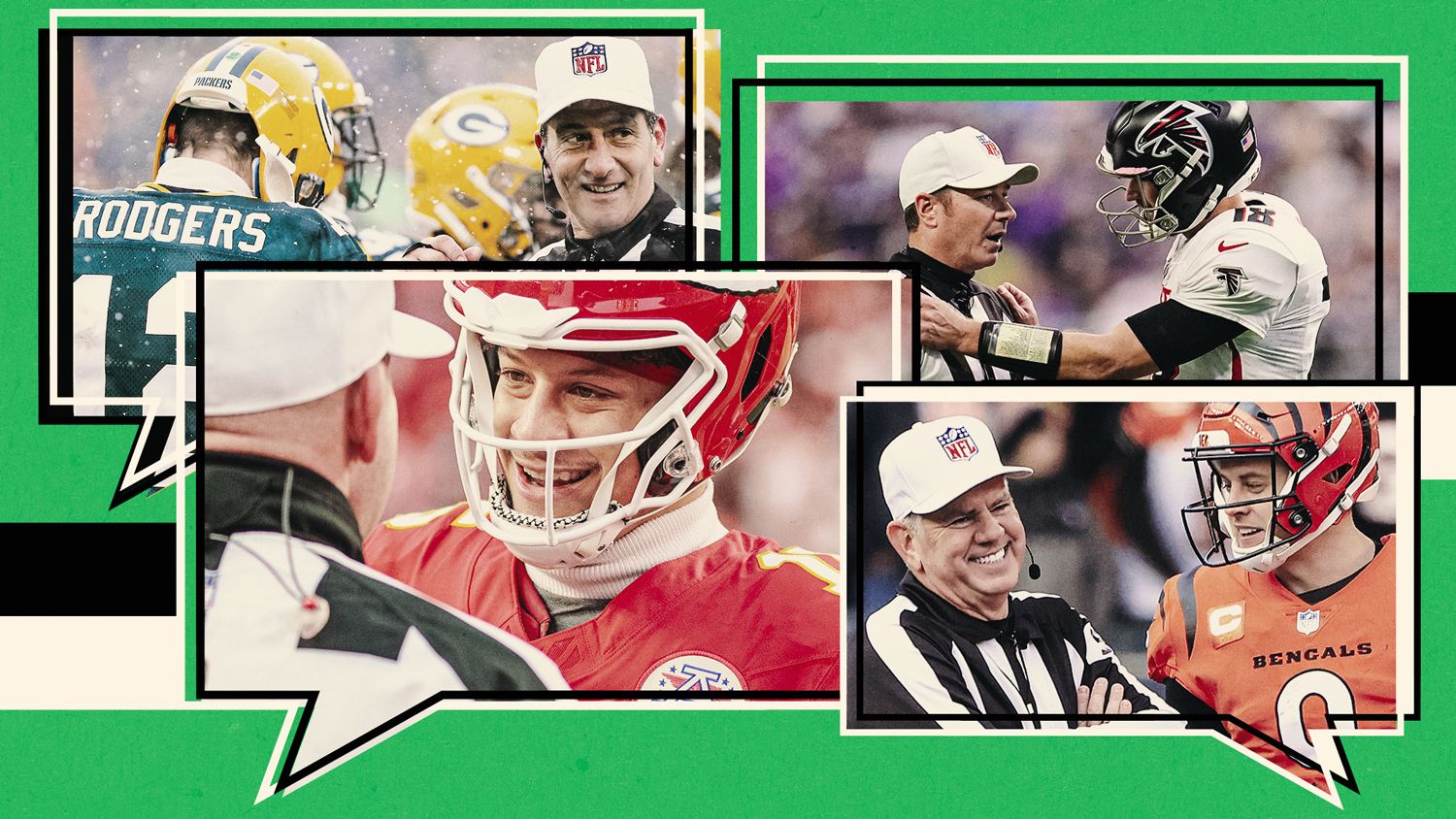
It wasn’t always like that, however.
Mariota described himself as an introvert early in his career, choosing to stay laser-focused on the game. Then Shawn Hochuli changed that. He would approach Mariota during games and just start talking, and after a while, Mariota realized that it was OK to take a couple of minutes here and there during a game to think about something other than the next play.
“I appreciate Hochuli for that,” Mariota said. “It has been really a treat for me to get to know them.”
There was one ref in particular who was able to connect on a human level with the players.
“I used to have fun with Gene [Steratore],” Pittsburgh Steelers quarterback Aaron Rodgers told ESPN. “Gene was the best.”
Los Angeles Rams QB Matthew Stafford recalled when Steratore, who retired in 2018, picked him up after a play.
“He was like, ‘Hell of a throw, Matty.’ I was like, ‘Thanks,'” Stafford said with a laugh. “He’s a good dude, and you could communicate.
“That’s my favorite, just guys that can communicate whether or not they understand we’re in a heated battle just like they are.”
Steratore is now a rules analyst for CBS.
“One time when I was in Cincinnati, it’s like starting the game and a timeout before we took the field,” Dalton said. “He said, ‘All right, let’s get ’em going now. Let’s have a good game.’ He was like cheering you on, which is cool. Or [I] made a good throw and he would say something like, ‘Hey, hey, great throw.’ Good job.’
“He was just a fan of football while he was calling the game. So it is one of those things that makes it, they’re people too. Sometimes you think they’re just the referees, but there is a personal side of it all.”
Some refs appreciate how certain quarterbacks can keep the mood light.
“Aaron Rodgers, a humorous guy,” referee Craig Wrolstad said. “He’s always funny. He’s really relaxed on the field, one of the most relaxed quarterbacks out there probably.
“He chats us up and he keeps it pretty funny, and if there’s something funny going on, he tries to make a joke about it where other guys are real serious.”
KANSAS CITY CHIEFS quarterbackPatrick Mahomes values his conversations with referees, but not for comedic reasons.
“You might ask [about] the alignment stuff or the motion-type of things and the timing [of the play] just to make sure we’re doing everything the right way,” Mahomes said. “That’s stuff that we have to continue to get better and better at, but just keeping an open dialogue because those guys are trying to make the game go as smoothly as possible so the players can dictate the game.”
New England Patriots quarterback Joshua Dobbs said refs will give him a heads-up that there’s 10 seconds until a TV timeout is over, which is Dobbs’ cue to call the play and break the huddle so he’s approaching the line of scrimmage when the broadcast resumes and the 25-second play clock begins.
Referee Alex Kemp will go up to the quarterback after a penalty or stoppage of play and tell them how much is on the clock when he blows his whistle.
“I try not to joke with them too much,” Kemp said. “They’re working and we’re working, too. There’s a place for levity at times.”
Blakeman will tell some quarterbacks that their left tackle needs to move up a few inches.
“Just game management stuff,” Blakeman said. “They might be thinking something, all of a sudden I blow the whistle to start, now it’s like, ‘Oh s—, let’s go, let’s go, let’s go.’
“But it is just warning stuff, stuff that I’ve learned over the years to do with guys and talk to guys about that makes their job just a little bit easier.”
Atlanta Falcons quarterback Kirk Cousins prefers Blakeman’s approach.
“I’ve had refs who don’t even tell me what’s going on,” Cousins said. “I’m on the road and in a loud environment and I’m waiting. And then suddenly they just start and it’s like, there’s no warning. Communication is a big deal.”
Cousins said there’s a clear and definite separation between the “really, really good head refs” and those who aren’t “really, really good.”
Blakeman has learned throughout his career whom he can yuk it up with and who is all business all the time from kickoff to triple zeroes. Younger quarterbacks tend to lean toward being serious throughout a game — and they may not know the refs’ names yet.
Older quarterbacks who have been around for a while, and especially those like Cardinals backup Jacoby Brissett who have played for multiple teams, have not only seen the same refs year after year, but they’ve gotten to know more than most quarterbacks because they’ve seen more referee groups.
“We’ve kind of grown up in this league together, some of these refs,” Brissett said.
Even for those referees, like Rogers who like to keep their interactions with quarterbacks more on the professional than personal side, sometimes a player will force the issue.
“There will be times when they’d ask you, ‘How are things at home?’ [I’d respond] ‘Well, good as far as I know. I’ll check in when I get back,'” Rogers said with a chuckle.
DURING A DECEMBER 2015 game in Philadelphia, Cousins, then with Washington, was confused by a call made by referee Walt Coleman.
“What are you doing?” Cousins asked Coleman.
After Coleman explained why he made the call, Cousins knew he himself was in the wrong. Then said “Oh, that’s right,” and put a hand on either side of Coleman’s head.
“He was like, ‘Oh,'” Cousins said. “But he knew my intent was just like, ‘Ah, you’re right.’ I grabbed him by the head and shook his head.
“It was almost like in ‘Billy Madison,’ when the guy goes, ‘Stay here as long as you can.'”
For some, if not all, the quarterbacks who engage with the referees, there’s an endgame, a reason, an intent behind the dialogue.
They all want calls.
“If something’s up in the air and the dude really likes you and y’all have a good relationship, I think it’s that much more of the human element when it comes to the chance of getting that call,” Bears backup quarterback Tyson Bagent said.
It has happened — even when a quarterback was least expecting it.
In his 2016 biography, “QB: My Life Behind the Spiral,” Hall of Fame quarterback Steve Young wrote about a 1985 game against the Indianapolis Colts when he was playing for the Tampa Bay Buccaneers in which the referee tried to set Young up with his daughter, who was going to BYU.
“Partway through the second quarter I’m in the huddle when the head referee taps me on the shoulder. ‘Can I talk to you for a second?’ he says. I step away from the huddle. ‘Hey, listen, my daughter’s going to BYU,’ he whispers. Next thing I know he starts trying to convince me that I should meet his daughter. ‘I’d like you to take her out,’ he says,” Young wrote.
Young was baffled, especially because it happened in the middle of the game. Later in the game, with the Bucs down 31-23, Young got a call he wasn’t expecting.
“I’m trying to mount a comeback,” he wrote. “I scramble out of the pocket and take a brutal hit. It causes me to fumble just before the whistle blows to stop the play. I am lying on the ground when the defense recovers the loose ball, all but sealing our defeat.
“Suddenly out of nowhere a yellow flag lands next to me. The referee whose daughter is headed to BYU calls a personal foul on the defense. First down, Tampa Bay. I get up and brush myself off. Then the ref walks past me and whispers, ‘She likes Italian food.'”
It doesn’t take dates anymore to get calls. Sometimes, it’s the product of years of shmoozing the same referee, years of friendly banter, years of jokes or just years of being a normal person and checking in on their family and their golf game.
“I’ve gotten some calls that weren’t calls, for sure,” Brissett said. “But, yeah, I think it definitely helps.”



